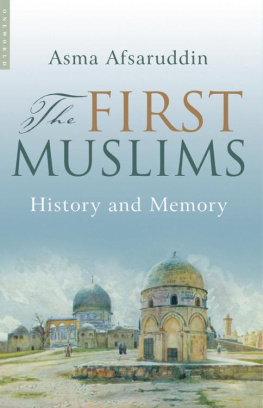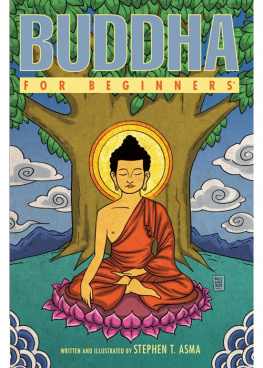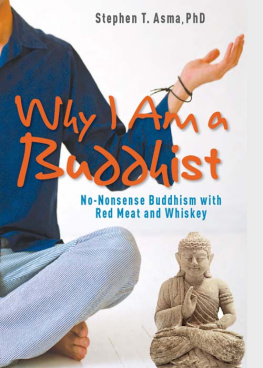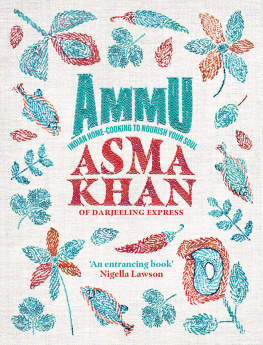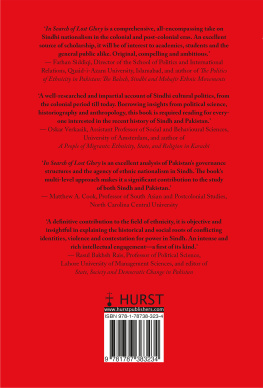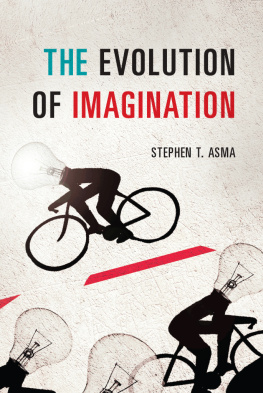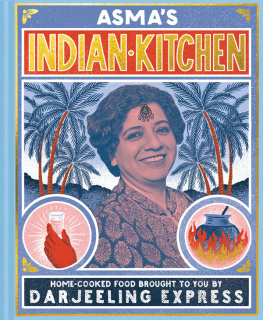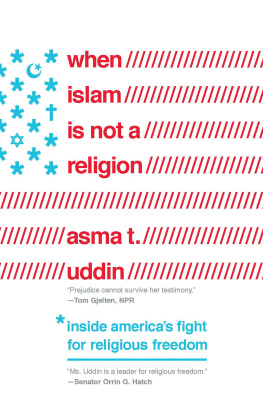Asma Afsaruddin - The First Muslims: History and Memory
Here you can read online Asma Afsaruddin - The First Muslims: History and Memory full text of the book (entire story) in english for free. Download pdf and epub, get meaning, cover and reviews about this ebook. year: 2013, publisher: Oneworld Publications, genre: Religion. Description of the work, (preface) as well as reviews are available. Best literature library LitArk.com created for fans of good reading and offers a wide selection of genres:
Romance novel
Science fiction
Adventure
Detective
Science
History
Home and family
Prose
Art
Politics
Computer
Non-fiction
Religion
Business
Children
Humor
Choose a favorite category and find really read worthwhile books. Enjoy immersion in the world of imagination, feel the emotions of the characters or learn something new for yourself, make an fascinating discovery.
- Book:The First Muslims: History and Memory
- Author:
- Publisher:Oneworld Publications
- Genre:
- Year:2013
- Rating:5 / 5
- Favourites:Add to favourites
- Your mark:
- 100
- 1
- 2
- 3
- 4
- 5
The First Muslims: History and Memory: summary, description and annotation
We offer to read an annotation, description, summary or preface (depends on what the author of the book "The First Muslims: History and Memory" wrote himself). If you haven't found the necessary information about the book — write in the comments, we will try to find it.
The First Muslims: History and Memory — read online for free the complete book (whole text) full work
Below is the text of the book, divided by pages. System saving the place of the last page read, allows you to conveniently read the book "The First Muslims: History and Memory" online for free, without having to search again every time where you left off. Put a bookmark, and you can go to the page where you finished reading at any time.
Font size:
Interval:
Bookmark:
The First Muslims
History and Memory
Asma Afsaruddin

A Oneworld Book
Published by Oneworld Publications 2008
Reprinted 2009, 2011
This ebook edition published in 2013
Copyright Asma Afsaruddin 2008
All rights reserved
Copyright under Berne Convention
A CIP record for this title is available
from the British Library
ISBN 9781851684977
eISBN 9781780744483
Typeset by Jayvee, Trivandrum, India
Cover design by Design Deluxe
Oneworld Publications
10 Bloomsbury Road
London WC1B 3SR
England
www.oneworld-publications.com
Stay up to date with the latest books,
special offers, and exclusive content from
Oneworld with our monthly newsletter
Sign up on our website
www.oneworld-publications.com
For all those who strive against malevolence in truth and dignity
When Oneworld Publications first approached me about writing a short history of the First Muslims, I had not fully envisaged this book. I had expected to write a fairly straightforward account of the major events and key figures of the early formative period of Islam. In the period of gestation, the current book evolved against the crisis-ridden backdrop of todays world. Hardly anything involving Islam and Muslims appears to take part in a vacuum anymore in the post-September 11 milieu. What influential Muslim intellectuals, politicians, and activists, whether in the Islamic heartlands or the West, choose to say and do often become the focus of intense scrutiny and commentary in intelligencegathering and policy-making circles in the United States and Europe, as well as in academic communities. The actions of the global purveyors of terrorism originating in Muslim-majority countries appear to have tarred all Muslims with the brush of suspicion. Muslim public discourses of self-validation and empowerment today provoke anxious unpacking and deconstruction among both Muslims and non-Muslims. Such Muslim discourses often point back to the generations of early pious Muslims, the salaf, and seek to discover the relevance of their lives and thought and establish their resonances today.
Thus I came to realize that writing about the earliest Muslims and their communities could not be accomplished today without writing about contemporary Muslims as well, on account of the historical and mimetic continuities between the two. This is why my book is as much about the present as it is about the past and why after spending more than the first half of the book talking about the first three generations of Muslims, I then switch to a discussion of todays Muslims and their issues. The concluding chapters establish how the salaf, as seen through different lenses, continue to shape the world-views and consciousness of many contemporary Muslims in many parts of the world, and why they will and must continue to do so.
A word about the method of dating used in this work. When a single date is used, it always refers to the Common Era date, unless specifically stated to the contrary. The infrequent double dates separated by a slash lists the Islamic Hijri date first followed by the Common Era date.
A number of good-hearted people read the whole or part of the manuscript and offered concrete suggestions for revisions and improvement. They include valuable colleagues and friends like Richard Serrano, Masood Farivar, Sebastian Guenther, and Walid Saleh, as well as the anonymous readers of this manuscript, to all of whom I record my thanks. My husband, Steve Vinson, not only read the manuscript and made valuable suggestions for improvement, but also provided critical moral support throughout this undertaking. I owe him a special debt of gratitude. My student assistant, Kendall Hannon, provided special assistance in compiling the bibliography, for which I am grateful. I would also like to thank the faculty and staff, particularly the director, Professor Muhammad Abd al-Haleem, at the Centre for Islamic Studies, School of Oriental and African Studies, London, England, where I spent part of my sabbatical year (fall, 2003), for providing a congenial environment in which to start this project. Thanks are also due to Mike Harpley of Oneworld Publications, who proved to be an efficient, wise, and patient editor. It goes without saying all remaining mistakes and shortcomings in the text are mine alone.
Who are the First Muslims? From a Quranic and general Muslim universalist perspective, the very first Muslim was Adam, the first human being fashioned by God from clay into whom He breathed His spirit (Quran 15:29; 38:72; 32:9). He was also the first prophet, beginning a line of prophecy and prophethood that ended with the mission of Muhammad ibn Abd Allah (d. 632). This universalist perspective is further reflected in the broad meaning assigned to the term Muslim: one who submits/surrenders to God. Such a broad definition has been applied to all those who have made a genuine affirmation of their faith in the one Divine Being and thus have professed true submission to Him. This is the meaning of the Arabic verbal noun al-Islam, the name given to this primordial religion of all those who submitted to God through time. In this basic, non-denominational sense, all prophets and righteous believers are Muslims (for example, Quran 2:136). Nature, created by God and submissive to Him, is also described as muslim in the Quran (3:83).
There is also the more circumscribed sense of Muslim and Islam, which dates from the start of the prophetic mission of Muhammad at a specific point in history. The Quran uses these terms in both these senses. We will, however, commence our narrative in the seventh century of the Common Era from the time when Islam as a specific religious-historical phenomenon and movement began, and not, like the famous pre-modern historian al-Tabari (d. 923), from the time of Adam. We do this while recognizing the simultaneously broad and circumscribed meanings of Muslim and Islam, which remain germane to the Quranic self-understanding of the universality of its message and implicit in our use of these terms, particularly for the early period.
This is a book about certain key events, ideas, and trends in early Islam and how they came together in the formative period. Other than the Prophet Muhammad himself, it also focuses on key personalities around and after the Prophet who have left their indelible mark on the religious, social, and intellectual history of Islam and who are valorized by later generations for their unique contributions to the evolution of this history. These personalities are historical figures to be sure, but in the way that their memory and legacy have been partially and creatively reconfigured by posterity, they are also to an extent, mythical and iconic characters who have fulfilled and continue to fulfil a deeply emotive and symbolic role through the generations. Their influence on the thinking of Muslims in the contemporary period cannot be overestimated. Such is the role of al-salaf al-salih (the Pious Forbears, salaf in short), with whom I have conflated the First Muslims.
There are competing definitions of the Pious Forbears. The application of this nomenclature is sometimes restricted to the generation of the Companions only, sometimes to the generations of the Companions and the Successors together, and more broadly, to the three generations of the Companions, Successors, and the Successors to the Successors. We have opted for the third, more inclusive definition, mainly because it would allow us to survey a broader span of historical time and assess the contributions of key figures from the third generation as well, whose influence has been seminal for the subsequent development of Islamic thought and practice. We are thus focusing on the period from the early life of Muhammad to the death of the last Successor to the Successors, roughly between 570855 CE . This broad swath of time for three generations is derived from the traditional dating given in the Arabic sources.
Next pageFont size:
Interval:
Bookmark:
Similar books «The First Muslims: History and Memory»
Look at similar books to The First Muslims: History and Memory. We have selected literature similar in name and meaning in the hope of providing readers with more options to find new, interesting, not yet read works.
Discussion, reviews of the book The First Muslims: History and Memory and just readers' own opinions. Leave your comments, write what you think about the work, its meaning or the main characters. Specify what exactly you liked and what you didn't like, and why you think so.

